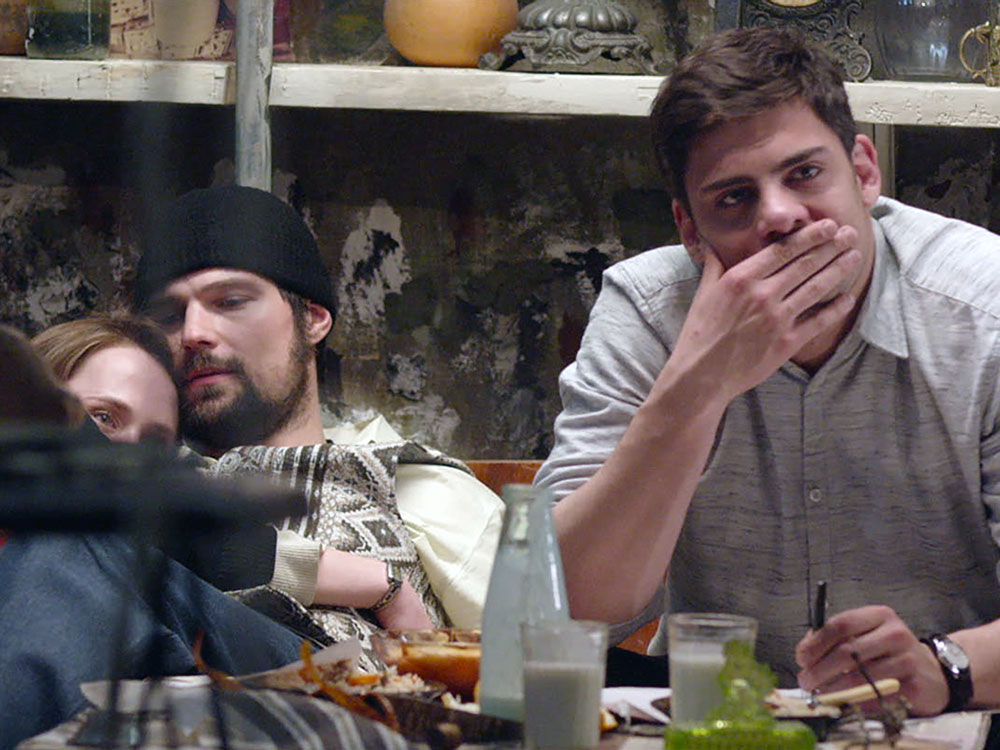Van Gogh, dir. Maurice Pialat, France 1991, French with English subtitles, 158 min.
Maurice Pialat ‘films’ the last sixty days of Van Gogh’s life. After leaving the asylum, Van Gogh settles in the home of Doctor Gachet, an art lover and patron. He continues painting amid conflicts with his brother Theo, the torments of his failing mental health, and an affair with Marguerite, his host’s daughter. Pialat is not interested in historical accuracy, but presents Van Gogh as a torn man who is primarily observed as a living presence. ‘We look, we film, we look again, and we see what we didn’t see,’ as Serge Daney put it.
At the end of his life, when he already knew he was seriously ill (he died in June 1992 of AIDS), Serge Daney published in Trafic a series of texts titled ‘Journal de l’an nouveau’: personal, existentially toned, diary-like writings in which he reflects on illness, looking, cinema, television, and his own life. Despite the gloomy predictions about the impending death of cinema, Daney still discerned flickers of vitality in cinema, including in Pialat’s Van Gogh, which ‘still managed to show life — that is, strictly speaking, death at work.’
Much of the power of Van Gogh, according to Daney, lies to a great extent in the status of its characters, who on screen do only part of what they do in reality, who are merely passing through the film, as French film critic Pierre Eugène retells Daney’s reading of Pialat. ‘A film character,’ Daney wrote in Trafic, ‘is someone who never belongs to a single film, who exists in other spaces, in other ‘compossible’ stories, Leibnizian ones.’ Thus, Pialat gives his characters, according to Daney, a materialist dimension: they are defined by their gestures, not by their place in the script. They move at the edges of the frame, signaling between screen and audience, and by their presence make other worlds imaginable — worlds in which they would be the main character (Eugène). Daney writes: ‘Pialat is, together with Rohmer, the one who extended to the character the properties of Bazin’s inherited ‘Janus Bifrons’: ontological realism — hence — the significance of the offscreen.’
‘My dear Maurice,
your film is astonishing, totally astonishing; far beyond the cinematographic horizon covered up until now by our wretched gaze. Your eye is a great heart that sends the camera hurtling among girls, boys, spaces, moments in time, and colours, like childish tantrums. The ensemble is miraculous; the details, sparks of light within this miracle; we see the big sky fall and rise from this poor and simple earth. All of my thanks, to you and yours, for this success – warm, incomparable, quivering.
Cordially yours,
Jean-Luc Godard’
This screening will be introduced by Michael Witt.
At the end of his life, when he already knew he was seriously ill (he died in June 1992 of AIDS), Serge Daney published in Trafic a series of texts titled ‘Journal de l’an nouveau’: personal, existentially toned, diary-like writings in which he reflects on illness, looking, cinema, television, and his own life. Despite the gloomy predictions about the impending death of cinema, Daney still discerned flickers of vitality in cinema, including in Pialat’s Van Gogh, which ‘still managed to show life — that is, strictly speaking, death at work.’
Much of the power of Van Gogh, according to Daney, lies to a great extent in the status of its characters, who on screen do only part of what they do in reality, who are merely passing through the film, as French film critic Pierre Eugène retells Daney’s reading of Pialat. ‘A film character,’ Daney wrote in Trafic, ‘is someone who never belongs to a single film, who exists in other spaces, in other ‘compossible’ stories, Leibnizian ones.’ Thus, Pialat gives his characters, according to Daney, a materialist dimension: they are defined by their gestures, not by their place in the script. They move at the edges of the frame, signaling between screen and audience, and by their presence make other worlds imaginable — worlds in which they would be the main character (Eugène). Daney writes: ‘Pialat is, together with Rohmer, the one who extended to the character the properties of Bazin’s inherited ‘Janus Bifrons’: ontological realism — hence — the significance of the offscreen.’
‘My dear Maurice,
your film is astonishing, totally astonishing; far beyond the cinematographic horizon covered up until now by our wretched gaze. Your eye is a great heart that sends the camera hurtling among girls, boys, spaces, moments in time, and colours, like childish tantrums. The ensemble is miraculous; the details, sparks of light within this miracle; we see the big sky fall and rise from this poor and simple earth. All of my thanks, to you and yours, for this success – warm, incomparable, quivering.
Cordially yours,
Jean-Luc Godard’
This screening will be introduced by Michael Witt.
05:00 pm
Sun, 07 Sep 2025
Cinema 1
Ticket information
- All tickets that do not require ID (full price, disabled, income support) can be printed at home or stored in email
- For aged-based concession tickets (under 25, student) please bring relevant ID to collect at the front desk before the event.
Access information
Cinema 1
- Both our Cinemas have step free access from The Mall and are accessible by ramp
- We have 1 wheelchair allocated space with a seat for a companion
- All seats are hard back, have a crushed velvet feel and they do not recline
- These are our seat size dimensions: W 42 x D 45 x H 52
- Arm rest either side of the seat dimensions: L 27 x W 7 x H 20
for the following requirements:
- We have unassigned seating. If you require a specific seat, please reserve this in advance
- Free for visitors where ticket prices are a barrier, please email
All films are ad-free and 18+ unless otherwise stated, and start with a 10 min. curated selection of trailers.
Members+ and all Patrons gain free entry to all cinema screenings, exhibitions, talks, and more.
Join today as a Member+ for £25/month.











no. 236848.